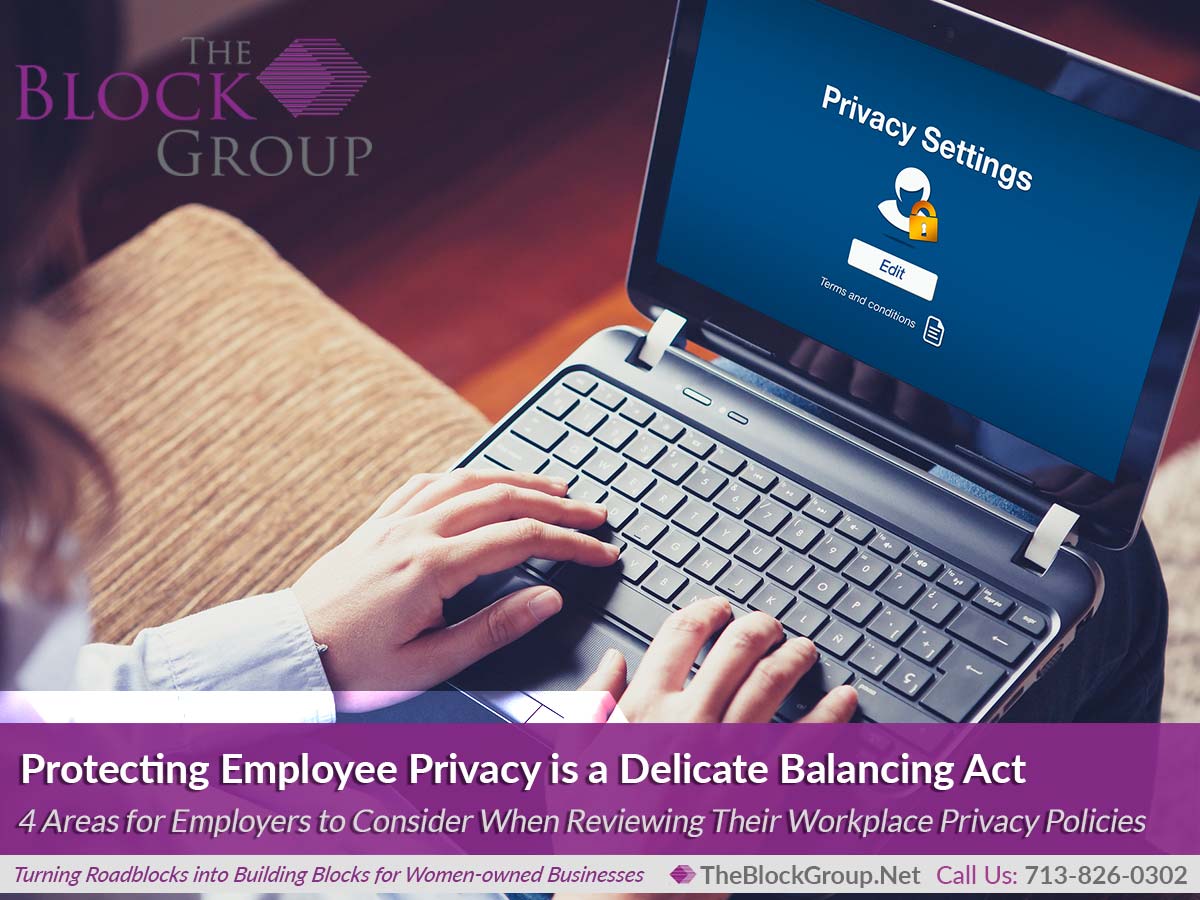
Protecting Employee Privacy is a Delicate Balancing Act
4 Areas for Employers to Consider When Reviewing Their Workplace Privacy Policies
Our growing dependence on technology is often at odds with our heightened concerns about protecting our personal information. Nowhere is the tension between technology and privacy rights more prevalent than in today’s workplace.
Businesses must strike a delicate balance when managing employee privacy issues and the legal and ethical factors that come into play.
The following are four areas for employers to consider when reviewing their workplace privacy policies:
Social media
It’s not uncommon for employers to monitor social media activity. Some companies check online accounts when screening job applicants, others do it to make sure proprietary information doesn’t go viral, or when investigating claims of misconduct.
This has led several states to pass laws that restrict an employer’s ability to access and monitor employees’ social media accounts, including requiring an employee or applicant to disclose their passwords, or list of contacts or “friends.”
The current best practice for employers is to avoid requesting any social media passwords, regardless of the state in which they do business.
Other more difficult decisions arise when an employee posts something online that casts the employer in a negative light. Here, employers must exercise caution and review each situation on a case-by-case basis.
Some social media posts may fall under the National Labor Relations Act (NLRA), which protects concerted activity by employees, such as making a complaint about workplace conditions or pay. This federal act applies whether the workforce is unionized or not.
On the other hand, if an employee posts an offensive picture of him or herself, this could form the basis of a non-discriminatory termination and the employee could be fired. Employers must ensure they treat all employees equally or they risk discrimination lawsuits. This means that if one employee is terminated for posting an offensive online picture, then another employee who also violates this work rule in the same way should be terminated as well.
Examples like these are why employers often find it difficult to draft social media policies. It’s a good idea to consult with an employment lawyer first to make sure the company policies and rules are clear and enforceable.
Physical searches, including e-mail accounts
Under the federal Stored Communications Act (SCA), an employer can review e-mails received and sent through its own server, but should avoid accessing an employee’s personal e-mail account — even if the password to that e-mail account is stored on a work-issued computer.
Employers should reserve the right to search desks, lockers, company computers, company e-mail and networks. Best practice is to inform employees in writing, preferably in the employee handbook, that the company reserves inspection rights and that no employee should have an expectation of privacy as to what is stored or communicated on or with company property.
Drug testing
Some state laws have limitations in place for employers that choose to conduct drug tests, and “under certain circumstances,” drug testing can lead to invasion of privacy claims. However, if compliant policies are in place and consistently applied, an employer generally can avoid such privacy claims.
Best practice includes avoiding random testing in favor of reasonable suspicion or post-accident drug testing. Reasonable suspicion testing should only be conducted if a manager observes signs of being under the influence, such as glassy eyes or slurred speech.
Surveillance cameras
Employers must weigh the legitimate needs to safeguard the workplace and protect company property against the reasonable expectations of privacy among employees. This is most clearly illustrated when installing surveillance equipment. This equipment should not be in areas where an employee should expect privacy, like a restroom or a locker room.
Best practice is to educate employees regarding the reasons for surveillance equipment and to provide advance notice of surveillance when available.
When it comes to privacy in the workplace, detailed, written policies are a must for any employer. Policies and procedures should be well-defined, widely communicated and reviewed at least annually. This will help to balance the company’s legitimate business interests with the privacy rights of its employees, and also ensure compliance with frequently changing state and federal privacy laws.
Source: Business Journal
Patty Block, President and Founder of The Block Group, established her company to advocate for women-owned businesses, helping them position their companies for strategic growth. From improving cash flow…. to increasing staff productivity…. to scaling for growth, these periods of transition — and so many more — provide both challenges and opportunities. Managed effectively, change can become a productive force for growth. The Block Group harnesses that potential, turning roadblocks into building blocks for women-owned businesses.

Business Coach in Denver Colorado
Business consulting for women entrepreneurs in Denver Colorado, Advice for women entrepreneurs, Business Coach in Denver Colorado, Growth strategies for small business, Business coaching for women, Growth for women-owned businesses, Denver Colorado business coaching, Financial strategies for small business, Small business consulting in Denver Colorado, Business management consultant, Business, Consulting, Women, Entrepreneurs, Denver Colorado, Coach, Growth, Strategies, Coaching, Owned, Owner, Financial, Consulting, Management.




